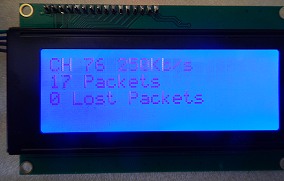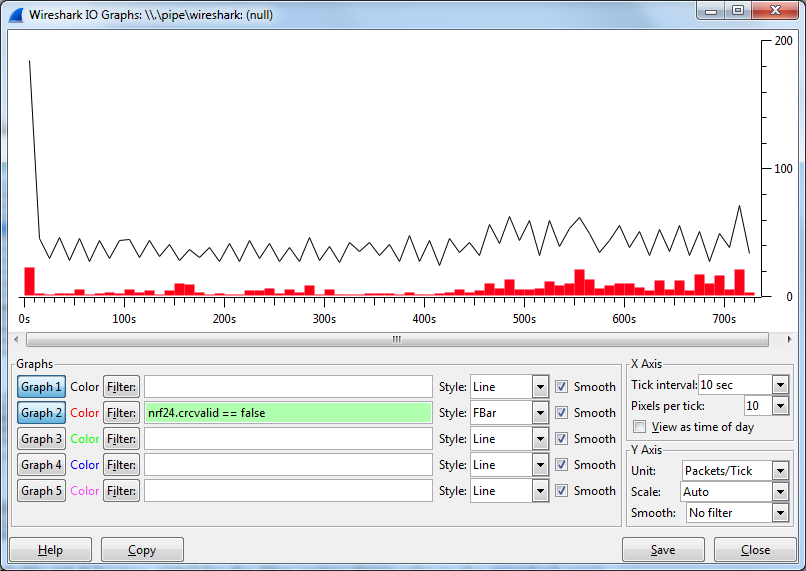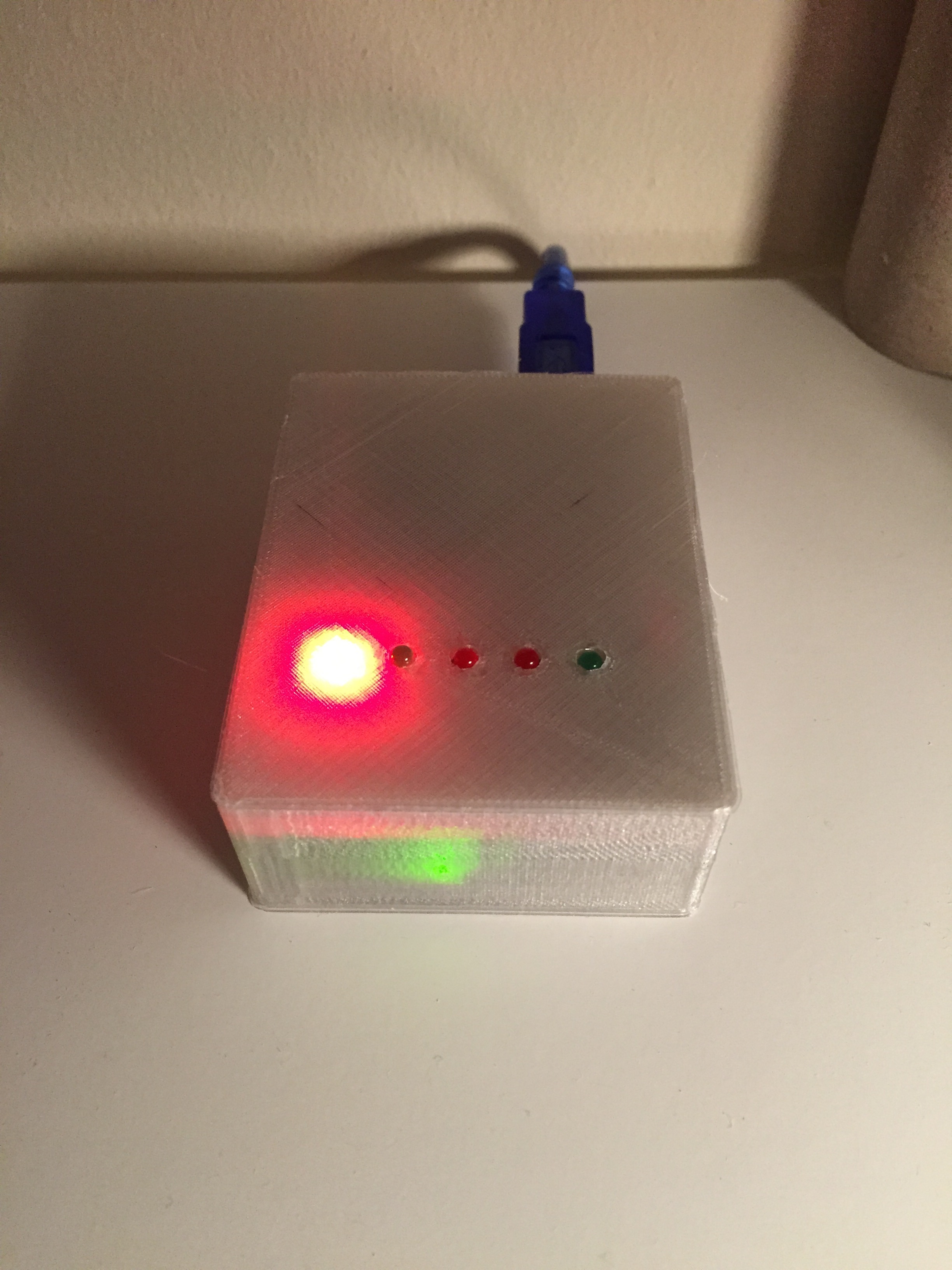Wireless nRF24L01+ sniffer for MySensors
-
In case anyone else is interested, I updated the sketch to work with a 20x4 LCD screen so that you can see how many packets have been captured. I used this LCD screen connected to the I2C interface. Make sure you get the correct LCD libraries for it as the default LCD libraries don't work with it. There's a link for them on the eBay page.
EDIT: There seems to be an issue capturing packets if it's also connected to the nrf24sniff program. It works fine standalone and also when BINARY_OUTPUT is undefined and talking to the Serial Monitor. I'l need to do more troubleshooting as to why.

Cheers
Al/* NRF24_Sniff - An Arduino sketch to promiscuous capture all wireless traffic generated by Nordic Semi. NRF24L01+ modules. Created by Ivo Pullens, Emmission, 2014 -- www.emmission.nl Updated by Sparkman, 2015 - added LCD support This program is free software: you can redistribute it and/or modify it under the terms of the GNU General Public License as published by the Free Software Foundation, either version 3 of the License, or (at your option) any later version. This program is distributed in the hope that it will be useful, but WITHOUT ANY WARRANTY; without even the implied warranty of MERCHANTABILITY or FITNESS FOR A PARTICULAR PURPOSE. See the GNU General Public License for more details. You should have received a copy of the GNU General Public License along with this program. If not, see <http://www.gnu.org/licenses/>. */ #include <Arduino.h> #include <SPI.h> #include <CircularBuffer.h> #include <RF24.h> #include <RF24_config.h> #include <Wire.h> #include <LiquidCrystal_I2C.h> #define LED_SUPPORTED #define LCD_SUPPORTED // Hardware configuration #define RF_CE_PIN (9) #define RF_CS_PIN (10) #define RF_IRQ_PIN (2) #define RF_IRQ (RF_IRQ_PIN-2) // Usually the interrupt = pin -2 (on uno/nano anyway) #ifdef LED_SUPPORTED #define LED_PIN_LISTEN (A0) #define LED_PIN_RX (A1) #define LED_PIN_TX (A2) #define LED_PIN_CONFIG (A3) #define LED_PIN_BUFF_FULL (A4) #endif #ifdef LCD_SUPPORTED LiquidCrystal_I2C lcd(0x27,20,4); // set the LCD address to 0x27 for a 20 chars and 4 line display #endif static uint32_t PacketCount = 0; static uint8_t lostPacketCount = 0; #define RF_MAX_ADDR_WIDTH (5) // Maximum address width, in bytes. MySensors use 5 bytes for addressing, where lowest byte is for node addressing. #define MAX_RF_PAYLOAD_SIZE (32) #define SER_BAUDRATE (115200) #define PACKET_BUFFER_SIZE (30) // Maximum number of packets that can be buffered between reception by NRF and transmission over serial port. #define PIPE (0) // Pipe number to use for listening // Startup defaults until user reconfigures it #define DEFAULT_RF_CHANNEL (76) // 76 = Default channel for MySensors. #define DEFAULT_RF_DATARATE (RF24_250KBPS) // Datarate #define DEFAULT_RF_ADDR_WIDTH (RF_MAX_ADDR_WIDTH) // We use all but the lowest address byte for promiscuous listening. First byte of data received will then be the node address. #define DEFAULT_RF_ADDR_PROMISC_WIDTH (DEFAULT_RF_ADDR_WIDTH-1) #define DEFAULT_RADIO_ID ((uint64_t)0xA8A8E1FC00LL) // 0xA8A8E1FC00LL = MySensors v2 (1.4) default #define DEFAULT_RF_CRC_LENGTH (2) // Length (in bytes) of NRF24 CRC #define DEFAULT_RF_PAYLOAD_SIZE (MAX_RF_PAYLOAD_SIZE) // Define NRF24 payload size to maximum, so we'll slurp as many bytes as possible from the packet. // If BINARY_OUTPUT is defined, this sketch will output in hex format to the PC. // If undefined it will output text output for development. #define BINARY_OUTPUT #include "NRF24_sniff_types.h" #ifndef BINARY_OUTPUT int my_putc( char c, FILE *t ) { Serial.write( c ); } #endif // Set up nRF24L01 radio on SPI bus plus CE/CS pins static RF24 radio(RF_CE_PIN, RF_CS_PIN); static NRF24_packet_t bufferData[PACKET_BUFFER_SIZE]; static CircularBuffer<NRF24_packet_t> packetBuffer(bufferData, sizeof(bufferData)/sizeof(bufferData[0])); static Serial_header_t serialHdr; static volatile Serial_config_t conf = { DEFAULT_RF_CHANNEL, DEFAULT_RF_DATARATE, DEFAULT_RF_ADDR_WIDTH, DEFAULT_RF_ADDR_PROMISC_WIDTH, DEFAULT_RADIO_ID, DEFAULT_RF_CRC_LENGTH, DEFAULT_RF_PAYLOAD_SIZE }; #define GET_PAYLOAD_LEN(p) ((p->packet[conf.addressLen-conf.addressPromiscLen] & 0xFC) >> 2) // First 6 bits of nRF header contain length. inline static void dumpData(uint8_t* p, int len) { #ifndef BINARY_OUTPUT while (len--) { printf("%02x", *p++); } Serial.print(' '); #else Serial.write(p, len); #endif } static void handleNrfIrq() { // Loop until RX buffer(s) contain no more packets. while (radio.available()) { #ifdef LED_SUPPORTED digitalWrite(LED_PIN_RX, HIGH); #endif if (!packetBuffer.full()) { #ifdef LED_SUPPORTED digitalWrite(LED_PIN_BUFF_FULL, LOW); #endif NRF24_packet_t* p = packetBuffer.getFront(); p->timestamp = micros(); // Micros does not increase in interrupt, but it can be used. p->packetsLost = lostPacketCount; uint8_t packetLen = radio.getPayloadSize(); if (packetLen > MAX_RF_PAYLOAD_SIZE) packetLen = MAX_RF_PAYLOAD_SIZE; radio.read( p->packet, packetLen ); // Determine length of actual payload (in bytes) received from NRF24 packet control field (bits 7..2 of byte with offset 1) // Enhanced shockburst format is assumed! if (GET_PAYLOAD_LEN(p) <= MAX_RF_PAYLOAD_SIZE) { // Seems like a valid packet. Enqueue it. packetBuffer.pushFront(p); PacketCount++; } else { // Packet with invalid size received. Could increase some counter... } lostPacketCount = 0; } else { // Buffer full. Increase lost packet counter. #ifdef LED_SUPPORTED digitalWrite(LED_PIN_BUFF_FULL, HIGH); #endif bool tx_ok, tx_fail, rx_ready; if (lostPacketCount < 255) lostPacketCount++; // Call 'whatHappened' to reset interrupt status. radio.whatHappened(tx_ok, tx_fail, rx_ready); // Flush buffer to drop the packet. radio.flush_rx(); } #ifdef LED_SUPPORTED digitalWrite(LED_PIN_RX, LOW); #endif } } static void activateConf( void ) { #ifdef LED_SUPPORTED digitalWrite(LED_PIN_CONFIG, HIGH); #endif // Match MySensors' channel & datarate radio.setChannel(conf.channel); radio.setDataRate((rf24_datarate_e)conf.rate); // Disable CRC & set fixed payload size to allow all packets captured to be returned by Nrf24. radio.disableCRC(); radio.setPayloadSize(conf.maxPayloadSize); // Configure listening pipe with the 'promiscuous' address and start listening radio.setAddressWidth(conf.addressPromiscLen); radio.openReadingPipe( PIPE, conf.address >> (8*(conf.addressLen - conf.addressPromiscLen)) ); radio.startListening(); // Attach interrupt handler to NRF IRQ output. Overwrites any earlier handler. attachInterrupt(RF_IRQ, handleNrfIrq, FALLING); // NRF24 Irq pin is active low. // Initialize serial header's address member to promiscuous address. uint64_t addr = conf.address; // TODO: probably add some shifting! for (int8_t i = sizeof(serialHdr.address)-1; i >= 0; --i) { serialHdr.address[i] = addr; addr >>= 8; } // Send config back. Write record length & message type uint8_t lenAndType = SET_MSG_TYPE(sizeof(conf), MSG_TYPE_CONFIG); dumpData(&lenAndType, sizeof(lenAndType)); // Write config dumpData((uint8_t*)&conf, sizeof(conf) ); #ifndef BINARY_OUTPUT Serial.print("Channel: "); Serial.println(conf.channel); Serial.print("Datarate: "); switch (conf.rate) { case 0: Serial.println("1Mb/s"); break; case 1: Serial.println("2Mb/s"); break; case 2: Serial.println("250Kb/s"); break; } Serial.print("Address: 0x"); uint64_t adr = conf.address; for (int8_t i = conf.addressLen-1; i >= 0; --i) { if ( i >= conf.addressLen - conf.addressPromiscLen ) { Serial.print((uint8_t)(adr >> (8*i)), HEX); } else { Serial.print("**"); } } Serial.println(""); Serial.print("Max payload: "); Serial.println(conf.maxPayloadSize); Serial.print("CRC length: "); Serial.println(conf.crcLength); Serial.println(""); radio.printDetails(); Serial.println(""); Serial.println("Listening..."); #endif #ifdef LED_SUPPORTED digitalWrite(LED_PIN_CONFIG, LOW); #endif #ifdef LCD_SUPPORTED lcd.setCursor(0, 0); lcd.print("CH "); lcd.print(conf.channel); switch (conf.rate) { case 0: lcd.print(" @ 1Mb/s"); break; case 1: lcd.print(" @ 2Mb/s"); break; case 2: lcd.print(" @ 250kb/s"); break; } #endif } void setup(void) { #ifdef LED_SUPPORTED pinMode(LED_PIN_LISTEN, OUTPUT); pinMode(LED_PIN_RX, OUTPUT); pinMode(LED_PIN_TX, OUTPUT); pinMode(LED_PIN_CONFIG, OUTPUT); pinMode(LED_PIN_BUFF_FULL, OUTPUT); digitalWrite(LED_PIN_LISTEN, LOW); digitalWrite(LED_PIN_RX, LOW); digitalWrite(LED_PIN_TX, LOW); digitalWrite(LED_PIN_CONFIG, LOW); digitalWrite(LED_PIN_BUFF_FULL, LOW); #endif #ifdef LCD_SUPPORTED lcd.init(); // initialize the lcd lcd.backlight(); lcd.clear(); lcd.home(); #endif Serial.begin(SER_BAUDRATE); #ifndef BINARY_OUTPUT fdevopen( &my_putc, 0); Serial.println("-- RF24 Sniff --"); #endif radio.begin(); // Disable shockburst radio.setAutoAck(false); radio.setRetries(0,0); // Configure nRF IRQ input pinMode(RF_IRQ_PIN, INPUT); #ifdef LED_SUPPORTED digitalWrite(LED_PIN_LISTEN, HIGH); #endif #ifdef LCD_SUPPORTED lcd.setCursor(0, 1); lcd.print(PacketCount); lcd.print(" Packets"); lcd.setCursor(0, 2); lcd.print(lostPacketCount); lcd.print(" Lost Packets"); #endif activateConf(); } void loop(void) { while (!packetBuffer.empty()) { #ifdef LED_SUPPORTED digitalWrite(LED_PIN_TX, HIGH); #endif // One or more records present NRF24_packet_t* p = packetBuffer.getBack(); int serialHdrLen = sizeof(serialHdr) - (conf.addressLen - conf.addressPromiscLen); serialHdr.timestamp = p->timestamp; serialHdr.packetsLost = p->packetsLost; // Calculate data length in bits, then round up to get full number of bytes. uint8_t dataLen = ( (serialHdrLen<<3) /* Serial packet header */ + ((conf.addressLen - conf.addressPromiscLen)<<3) /* NRF24 LSB address byte(s) */ + 9 /* NRF24 control field */ + (GET_PAYLOAD_LEN(p) << 3) /* NRF24 payload length */ + (conf.crcLength << 3) /* NRF24 crc length */ + 7 /* Round up to full nr. of bytes */ ) >> 3; /* Convert from bits to bytes */ // Write record length & message type uint8_t lenAndType = SET_MSG_TYPE(dataLen, MSG_TYPE_PACKET); dumpData(&dataLen, sizeof(lenAndType)); // Write serial header dumpData((uint8_t*)&serialHdr, serialHdrLen ); // Write packet data dumpData(p->packet, dataLen - serialHdrLen); #ifndef BINARY_OUTPUT if (p->packetsLost > 0) { Serial.print(" Lost: "); Serial.print(p->packetsLost); } Serial.println(""); #endif // Remove record as we're done with it. packetBuffer.popBack(); #ifdef LED_SUPPORTED digitalWrite(LED_PIN_TX, LOW); #endif } #ifdef LCD_SUPPORTED lcd.setCursor(0, 1); lcd.print(PacketCount); lcd.print(" Packets"); lcd.setCursor(0, 2); lcd.print(lostPacketCount); lcd.print(" Lost Packets"); #endif // Test if new config comes in uint8_t lenAndType; if (Serial.available() >= sizeof(lenAndType) + sizeof(conf)) { lenAndType = Serial.read(); if ((GET_MSG_TYPE(lenAndType) == MSG_TYPE_CONFIG) && (GET_MSG_LEN(lenAndType) == sizeof(conf))) { // Disable nRF interrupt while reading & activating new configuration. noInterrupts(); // Retrieve the new configuration uint8_t* c = (uint8_t*)(&conf); for (uint8_t i = 0; i < sizeof(conf); ++i) { *c++ = Serial.read(); } // Clear any packets in the buffer and flush rx buffer. packetBuffer.clear(); radio.flush_rx(); // Activate new config & re-enable nRF interrupt. activateConf(); interrupts(); } else { #ifndef BINARY_OUTPUT Serial.println("Illegal configuration received!"); #endif #ifdef LCD_SUPPORTED lcd.setCursor(0, 3); lcd.print("Illegal Config"); #endif } } } -
It would be a noce idea to create a portable 'sniffer' which you could easily position around the house (compared to a laptop + sniffer).
If it could do charts like Wireshark, e.g.
it would be very easy to determine signal quality and the like!
Requires dissection on the sinffer, though. -
It would be a noce idea to create a portable 'sniffer' which you could easily position around the house (compared to a laptop + sniffer).
If it could do charts like Wireshark, e.g.
it would be very easy to determine signal quality and the like!
Requires dissection on the sinffer, though. -
So, remember that pcb I showed earlier.
This is what it looks like with a 3D printed green glow in the dark case around it :)
-
A portable version of the nRF24L01+ sniffer could be extremely useful. Anyone know if it would be possible to combining a nRF24L01+ and an ESP8266 into an Arduino giving it the capability to transmit the nRF24L01+ data over WIFI to a computer running wireshark? I dont have the time to research the possibility right now, but will keep this in mind for the future.
-
So, remember that pcb I showed earlier.
This is what it looks like with a 3D printed green glow in the dark case around it :)
-
Hello,
Great job !!! I am French so excuse my broken English. Does someone could guide me? At launch Wireshark, I have a message systematically "tvb_lenght The procedure entry point is not found in the dynamic link library C: \ Program Files (x86) \ Wireshark \ plugins \ 1.12.4 \ mysensors1.dll" then same for mysensors2, nrf24.dll, radiohead.dll. I'm sure I added DLL in Wireshark, and tried the 64b version and the 32b, under Windows 8.1. If someone has an idea, THANK YOU :) -
Hello,
Great job !!! I am French so excuse my broken English. Does someone could guide me? At launch Wireshark, I have a message systematically "tvb_lenght The procedure entry point is not found in the dynamic link library C: \ Program Files (x86) \ Wireshark \ plugins \ 1.12.4 \ mysensors1.dll" then same for mysensors2, nrf24.dll, radiohead.dll. I'm sure I added DLL in Wireshark, and tried the 64b version and the 32b, under Windows 8.1. If someone has an idea, THANK YOU :) -
Hi, Nice job what yoh've done here.
Awkardly, I am not able to compile the sketch. I have download the last version available form github, but when I try to compile it, the IDE hungs about 60% and nothingelse happens. The compiler log looks like this:Utilizando biblioteca SPI en carpeta: C:\Program Files\Arduino\hardware\arduino\avr\libraries\SPI
Utilizando biblioteca CircularBuffer_Sniff en carpeta: C:\Users\arnalbago\Documents\Arduino\libraries\CircularBuffer_Sniff (legacy)
Utilizando biblioteca RF24-master en carpeta: C:\Users\arnalbago\Documents\Arduino\libraries\RF24-master (legacy)
Utilizando biblioteca RF24_Sniff en carpeta: C:\Users\arnalbago\Documents\Arduino\libraries\RF24_Sniff (legacy)C:\Program Files\Arduino\hardware\tools\avr/bin/avr-g++ -c -g -Os -fno-exceptions -ffunction-sections -fdata-sections -fno-threadsafe-statics -MMD -mmcu=atmega328p -DF_CPU=16000000L -DARDUINO=10604 -DARDUINO_AVR_NANO -DARDUINO_ARCH_AVR -IC:\Program Files\Arduino\hardware\arduino\avr\cores\arduino -IC:\Program Files\Arduino\hardware\arduino\avr\variants\eightanaloginputs -IC:\Program Files\Arduino\hardware\arduino\avr\libraries\SPI -IC:\Users\arnalbago\Documents\Arduino\libraries\CircularBuffer_Sniff -IC:\Users\arnalbago\Documents\Arduino\libraries\RF24-master -IC:\Users\arnalbago\Documents\Arduino\libraries\RF24_Sniff C:\Users\ARNALB~1\AppData\Local\Temp\build2068833823121923998.tmp\NRF24_sniff.cpp -o C:\Users\ARNALB~1\AppData\Local\Temp\build2068833823121923998.tmp\NRF24_sniff.cpp.o
C:\Program Files\Arduino\hardware\tools\avr/bin/avr-g++ -c -g -Os -fno-exceptions -ffunction-sections -fdata-sections -fno-threadsafe-statics -MMD -mmcu=atmega328p -DF_CPU=16000000L -DARDUINO=10604 -DARDUINO_AVR_NANO -DARDUINO_ARCH_AVR -IC:\Program Files\Arduino\hardware\arduino\avr\cores\arduino -IC:\Program Files\Arduino\hardware\arduino\avr\variants\eightanaloginputs -IC:\Program Files\Arduino\hardware\arduino\avr\libraries\SPI -IC:\Users\arnalbago\Documents\Arduino\libraries\CircularBuffer_Sniff -IC:\Users\arnalbago\Documents\Arduino\libraries\RF24-master -IC:\Users\arnalbago\Documents\Arduino\libraries\RF24_Sniff C:\Users\ARNALB~1\AppData\Local\Temp\build2068833823121923998.tmp\RF24.cpp -o C:\Users\ARNALB~1\AppData\Local\Temp\build2068833823121923998.tmp\RF24.cpp.o
Utilizando archivo previamente compilado: C:\Users\ARNALB~1\AppData\Local\Temp\build2068833823121923998.tmp\SPI\SPI.cpp.o
Utilizando archivo previamente compilado: C:\Users\ARNALB~1\AppData\Local\Temp\build2068833823121923998.tmp\RF24-master\RF24.cpp.o
Utilizando archivo previamente compilado: C:\Users\ARNALB~1\AppData\Local\Temp\build2068833823121923998.tmp\RF24_Sniff\RF24.cpp.o
Utilizando archivo previamente compilado: C:\Users\ARNALB~1\AppData\Local\Temp\build2068833823121923998.tmp\hooks.c.o
Utilizando archivo previamente compilado: C:\Users\ARNALB~1\AppData\Local\Temp\build2068833823121923998.tmp\WInterrupts.c.o
Utilizando archivo previamente compilado: C:\Users\ARNALB~1\AppData\Local\Temp\build2068833823121923998.tmp\wiring.c.o
Utilizando archivo previamente compilado: C:\Users\ARNALB~1\AppData\Local\Temp\build2068833823121923998.tmp\wiring_analog.c.o
Utilizando archivo previamente compilado: C:\Users\ARNALB~1\AppData\Local\Temp\build2068833823121923998.tmp\wiring_digital.c.o
Utilizando archivo previamente compilado: C:\Users\ARNALB~1\AppData\Local\Temp\build2068833823121923998.tmp\wiring_pulse.c.o
Utilizando archivo previamente compilado: C:\Users\ARNALB~1\AppData\Local\Temp\build2068833823121923998.tmp\wiring_shift.c.o
Utilizando archivo previamente compilado: C:\Users\ARNALB~1\AppData\Local\Temp\build2068833823121923998.tmp\abi.cpp.o
Utilizando archivo previamente compilado: C:\Users\ARNALB~1\AppData\Local\Temp\build2068833823121923998.tmp\CDC.cpp.o
Utilizando archivo previamente compilado: C:\Users\ARNALB~1\AppData\Local\Temp\build2068833823121923998.tmp\HardwareSerial.cpp.o
Utilizando archivo previamente compilado: C:\Users\ARNALB~1\AppData\Local\Temp\build2068833823121923998.tmp\HardwareSerial0.cpp.o
Utilizando archivo previamente compilado: C:\Users\ARNALB~1\AppData\Local\Temp\build2068833823121923998.tmp\HardwareSerial1.cpp.o
Utilizando archivo previamente compilado: C:\Users\ARNALB~1\AppData\Local\Temp\build2068833823121923998.tmp\HardwareSerial2.cpp.o
Utilizando archivo previamente compilado: C:\Users\ARNALB~1\AppData\Local\Temp\build2068833823121923998.tmp\HardwareSerial3.cpp.o
Utilizando archivo previamente compilado: C:\Users\ARNALB~1\AppData\Local\Temp\build2068833823121923998.tmp\HID.cpp.o
Utilizando archivo previamente compilado: C:\Users\ARNALB~1\AppData\Local\Temp\build2068833823121923998.tmp\IPAddress.cpp.o
Utilizando archivo previamente compilado: C:\Users\ARNALB~1\AppData\Local\Temp\build2068833823121923998.tmp\main.cpp.o
Utilizando archivo previamente compilado: C:\Users\ARNALB~1\AppData\Local\Temp\build2068833823121923998.tmp\new.cpp.o
Utilizando archivo previamente compilado: C:\Users\ARNALB~1\AppData\Local\Temp\build2068833823121923998.tmp\Print.cpp.o
Utilizando archivo previamente compilado: C:\Users\ARNALB~1\AppData\Local\Temp\build2068833823121923998.tmp\Stream.cpp.o
Utilizando archivo previamente compilado: C:\Users\ARNALB~1\AppData\Local\Temp\build2068833823121923998.tmp\Tone.cpp.o
Utilizando archivo previamente compilado: C:\Users\ARNALB~1\AppData\Local\Temp\build2068833823121923998.tmp\USBCore.cpp.o
Utilizando archivo previamente compilado: C:\Users\ARNALB~1\AppData\Local\Temp\build2068833823121923998.tmp\WMath.cpp.o
Utilizando archivo previamente compilado: C:\Users\ARNALB~1\AppData\Local\Temp\build2068833823121923998.tmp\WString.cpp.o
Utilizando archivo previamente compilado: C:\Users\ARNALB~1\AppData\Local\Temp\build2068833823121923998.tmp\core.a
C:\Program Files\Arduino\hardware\tools\avr/bin/avr-gcc -Os -Wl,--gc-sections -mmcu=atmega328p -o C:\Users\ARNALB~1\AppData\Local\Temp\build2068833823121923998.tmp/NRF24_sniff.cpp.elf C:\Users\ARNALB~1\AppData\Local\Temp\build2068833823121923998.tmp\NRF24_sniff.cpp.o C:\Users\ARNALB~1\AppData\Local\Temp\build2068833823121923998.tmp\RF24.cpp.o C:\Users\ARNALB~1\AppData\Local\Temp\build2068833823121923998.tmp\SPI\SPI.cpp.o C:\Users\ARNALB~1\AppData\Local\Temp\build2068833823121923998.tmp\RF24-master\RF24.cpp.o C:\Users\ARNALB~1\AppData\Local\Temp\build2068833823121923998.tmp\RF24_Sniff\RF24.cpp.o C:\Users\ARNALB~1\AppData\Local\Temp\build2068833823121923998.tmp/core.a -LC:\Users\ARNALB~1\AppData\Local\Temp\build2068833823121923998.tmp -lmDoes anyone know what could be happening with this?
I would appreciate any help you can provide.Thanks, regards.
-
Hi, Nice job what yoh've done here.
Awkardly, I am not able to compile the sketch. I have download the last version available form github, but when I try to compile it, the IDE hungs about 60% and nothingelse happens. The compiler log looks like this:Utilizando biblioteca SPI en carpeta: C:\Program Files\Arduino\hardware\arduino\avr\libraries\SPI
Utilizando biblioteca CircularBuffer_Sniff en carpeta: C:\Users\arnalbago\Documents\Arduino\libraries\CircularBuffer_Sniff (legacy)
Utilizando biblioteca RF24-master en carpeta: C:\Users\arnalbago\Documents\Arduino\libraries\RF24-master (legacy)
Utilizando biblioteca RF24_Sniff en carpeta: C:\Users\arnalbago\Documents\Arduino\libraries\RF24_Sniff (legacy)C:\Program Files\Arduino\hardware\tools\avr/bin/avr-g++ -c -g -Os -fno-exceptions -ffunction-sections -fdata-sections -fno-threadsafe-statics -MMD -mmcu=atmega328p -DF_CPU=16000000L -DARDUINO=10604 -DARDUINO_AVR_NANO -DARDUINO_ARCH_AVR -IC:\Program Files\Arduino\hardware\arduino\avr\cores\arduino -IC:\Program Files\Arduino\hardware\arduino\avr\variants\eightanaloginputs -IC:\Program Files\Arduino\hardware\arduino\avr\libraries\SPI -IC:\Users\arnalbago\Documents\Arduino\libraries\CircularBuffer_Sniff -IC:\Users\arnalbago\Documents\Arduino\libraries\RF24-master -IC:\Users\arnalbago\Documents\Arduino\libraries\RF24_Sniff C:\Users\ARNALB~1\AppData\Local\Temp\build2068833823121923998.tmp\NRF24_sniff.cpp -o C:\Users\ARNALB~1\AppData\Local\Temp\build2068833823121923998.tmp\NRF24_sniff.cpp.o
C:\Program Files\Arduino\hardware\tools\avr/bin/avr-g++ -c -g -Os -fno-exceptions -ffunction-sections -fdata-sections -fno-threadsafe-statics -MMD -mmcu=atmega328p -DF_CPU=16000000L -DARDUINO=10604 -DARDUINO_AVR_NANO -DARDUINO_ARCH_AVR -IC:\Program Files\Arduino\hardware\arduino\avr\cores\arduino -IC:\Program Files\Arduino\hardware\arduino\avr\variants\eightanaloginputs -IC:\Program Files\Arduino\hardware\arduino\avr\libraries\SPI -IC:\Users\arnalbago\Documents\Arduino\libraries\CircularBuffer_Sniff -IC:\Users\arnalbago\Documents\Arduino\libraries\RF24-master -IC:\Users\arnalbago\Documents\Arduino\libraries\RF24_Sniff C:\Users\ARNALB~1\AppData\Local\Temp\build2068833823121923998.tmp\RF24.cpp -o C:\Users\ARNALB~1\AppData\Local\Temp\build2068833823121923998.tmp\RF24.cpp.o
Utilizando archivo previamente compilado: C:\Users\ARNALB~1\AppData\Local\Temp\build2068833823121923998.tmp\SPI\SPI.cpp.o
Utilizando archivo previamente compilado: C:\Users\ARNALB~1\AppData\Local\Temp\build2068833823121923998.tmp\RF24-master\RF24.cpp.o
Utilizando archivo previamente compilado: C:\Users\ARNALB~1\AppData\Local\Temp\build2068833823121923998.tmp\RF24_Sniff\RF24.cpp.o
Utilizando archivo previamente compilado: C:\Users\ARNALB~1\AppData\Local\Temp\build2068833823121923998.tmp\hooks.c.o
Utilizando archivo previamente compilado: C:\Users\ARNALB~1\AppData\Local\Temp\build2068833823121923998.tmp\WInterrupts.c.o
Utilizando archivo previamente compilado: C:\Users\ARNALB~1\AppData\Local\Temp\build2068833823121923998.tmp\wiring.c.o
Utilizando archivo previamente compilado: C:\Users\ARNALB~1\AppData\Local\Temp\build2068833823121923998.tmp\wiring_analog.c.o
Utilizando archivo previamente compilado: C:\Users\ARNALB~1\AppData\Local\Temp\build2068833823121923998.tmp\wiring_digital.c.o
Utilizando archivo previamente compilado: C:\Users\ARNALB~1\AppData\Local\Temp\build2068833823121923998.tmp\wiring_pulse.c.o
Utilizando archivo previamente compilado: C:\Users\ARNALB~1\AppData\Local\Temp\build2068833823121923998.tmp\wiring_shift.c.o
Utilizando archivo previamente compilado: C:\Users\ARNALB~1\AppData\Local\Temp\build2068833823121923998.tmp\abi.cpp.o
Utilizando archivo previamente compilado: C:\Users\ARNALB~1\AppData\Local\Temp\build2068833823121923998.tmp\CDC.cpp.o
Utilizando archivo previamente compilado: C:\Users\ARNALB~1\AppData\Local\Temp\build2068833823121923998.tmp\HardwareSerial.cpp.o
Utilizando archivo previamente compilado: C:\Users\ARNALB~1\AppData\Local\Temp\build2068833823121923998.tmp\HardwareSerial0.cpp.o
Utilizando archivo previamente compilado: C:\Users\ARNALB~1\AppData\Local\Temp\build2068833823121923998.tmp\HardwareSerial1.cpp.o
Utilizando archivo previamente compilado: C:\Users\ARNALB~1\AppData\Local\Temp\build2068833823121923998.tmp\HardwareSerial2.cpp.o
Utilizando archivo previamente compilado: C:\Users\ARNALB~1\AppData\Local\Temp\build2068833823121923998.tmp\HardwareSerial3.cpp.o
Utilizando archivo previamente compilado: C:\Users\ARNALB~1\AppData\Local\Temp\build2068833823121923998.tmp\HID.cpp.o
Utilizando archivo previamente compilado: C:\Users\ARNALB~1\AppData\Local\Temp\build2068833823121923998.tmp\IPAddress.cpp.o
Utilizando archivo previamente compilado: C:\Users\ARNALB~1\AppData\Local\Temp\build2068833823121923998.tmp\main.cpp.o
Utilizando archivo previamente compilado: C:\Users\ARNALB~1\AppData\Local\Temp\build2068833823121923998.tmp\new.cpp.o
Utilizando archivo previamente compilado: C:\Users\ARNALB~1\AppData\Local\Temp\build2068833823121923998.tmp\Print.cpp.o
Utilizando archivo previamente compilado: C:\Users\ARNALB~1\AppData\Local\Temp\build2068833823121923998.tmp\Stream.cpp.o
Utilizando archivo previamente compilado: C:\Users\ARNALB~1\AppData\Local\Temp\build2068833823121923998.tmp\Tone.cpp.o
Utilizando archivo previamente compilado: C:\Users\ARNALB~1\AppData\Local\Temp\build2068833823121923998.tmp\USBCore.cpp.o
Utilizando archivo previamente compilado: C:\Users\ARNALB~1\AppData\Local\Temp\build2068833823121923998.tmp\WMath.cpp.o
Utilizando archivo previamente compilado: C:\Users\ARNALB~1\AppData\Local\Temp\build2068833823121923998.tmp\WString.cpp.o
Utilizando archivo previamente compilado: C:\Users\ARNALB~1\AppData\Local\Temp\build2068833823121923998.tmp\core.a
C:\Program Files\Arduino\hardware\tools\avr/bin/avr-gcc -Os -Wl,--gc-sections -mmcu=atmega328p -o C:\Users\ARNALB~1\AppData\Local\Temp\build2068833823121923998.tmp/NRF24_sniff.cpp.elf C:\Users\ARNALB~1\AppData\Local\Temp\build2068833823121923998.tmp\NRF24_sniff.cpp.o C:\Users\ARNALB~1\AppData\Local\Temp\build2068833823121923998.tmp\RF24.cpp.o C:\Users\ARNALB~1\AppData\Local\Temp\build2068833823121923998.tmp\SPI\SPI.cpp.o C:\Users\ARNALB~1\AppData\Local\Temp\build2068833823121923998.tmp\RF24-master\RF24.cpp.o C:\Users\ARNALB~1\AppData\Local\Temp\build2068833823121923998.tmp\RF24_Sniff\RF24.cpp.o C:\Users\ARNALB~1\AppData\Local\Temp\build2068833823121923998.tmp/core.a -LC:\Users\ARNALB~1\AppData\Local\Temp\build2068833823121923998.tmp -lmDoes anyone know what could be happening with this?
I would appreciate any help you can provide.Thanks, regards.
@gonzalonal I reproduced compiling the latest version on Github with Arduino IDE 1.6.5.
It compiles without problems on my IDE, on Windows.
Some things you can try:- Reinstall the Arduino IDE and/or make sure you're using 1.6.5
- Extract the NRF24 Sniffer source code to its own sketchbook location. Don't put any other stuff in there (e.g. no MySensors libraries). Point the Arduino IDE to this location (File -> Preferences -> Sketchbook location, save and restart the IDE)
Good luck!
-
@gonzalonal I reproduced compiling the latest version on Github with Arduino IDE 1.6.5.
It compiles without problems on my IDE, on Windows.
Some things you can try:- Reinstall the Arduino IDE and/or make sure you're using 1.6.5
- Extract the NRF24 Sniffer source code to its own sketchbook location. Don't put any other stuff in there (e.g. no MySensors libraries). Point the Arduino IDE to this location (File -> Preferences -> Sketchbook location, save and restart the IDE)
Good luck!
@Yveaux
Thanks Yveaux. Pointing the sketch path in the right direction made the trick.
Once again, thanks.Regards.
-
Is there anyone who has the Wireshark dissectors for the latest 1.5 api?
Mine is complaining about "The Procedure entry point tvb_length could not be located in the DLL library libwireshark.dll" -
Is there anyone who has the Wireshark dissectors for the latest 1.5 api?
Mine is complaining about "The Procedure entry point tvb_length could not be located in the DLL library libwireshark.dll" -
Hi there,
The (my:blush: ) sniffer tool has trouble interpretating float values, received from temperature/humidity sensors.
The data payload indicates that the sniffer receives 5 bytes instead of the expected 4 bytes of the float32 variable, the extra byte is always a 0x01. The preceeding 4 bytes are the expected bytes of the float.
After swapping the hardware, both cpu and nrf24 , still the same result....
Integers and booleans are received OK, and my serial gateway receives the correct float values. -
Hi there,
The (my:blush: ) sniffer tool has trouble interpretating float values, received from temperature/humidity sensors.
The data payload indicates that the sniffer receives 5 bytes instead of the expected 4 bytes of the float32 variable, the extra byte is always a 0x01. The preceeding 4 bytes are the expected bytes of the float.
After swapping the hardware, both cpu and nrf24 , still the same result....
Integers and booleans are received OK, and my serial gateway receives the correct float values. -
-
@Yveaux
Hi, thanks for the quick response....
But I do not understand: I get float values on my screen but the wrong interpretation.
Perhaps a better question: is there an indication when this will be solved, as I appreciate the sniffer tool very much!?was not implemented yet
Maybe I should rephrase: it was implemented, but doesn't work right ;-)
See: https://github.com/Yveaux/NRF24_Sniffer/issues/2For MySensors 2.0 the sniffer will have to be updated.
I might pick this one up along the way. -
was not implemented yet
Maybe I should rephrase: it was implemented, but doesn't work right ;-)
See: https://github.com/Yveaux/NRF24_Sniffer/issues/2For MySensors 2.0 the sniffer will have to be updated.
I might pick this one up along the way. -
@Yveaux said in Wireless nRF24L01+ sniffer for MySensors:
For MySensors 2.0 the sniffer will have to be updated.
Any chance for Mysensrs 2.1.1 support? -
@bilbolodz not from my side anywhere soon... Just too busy...
